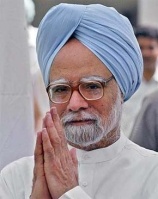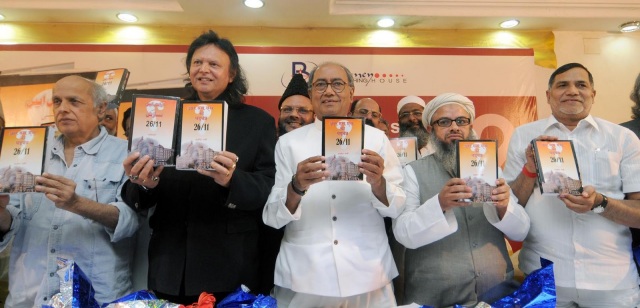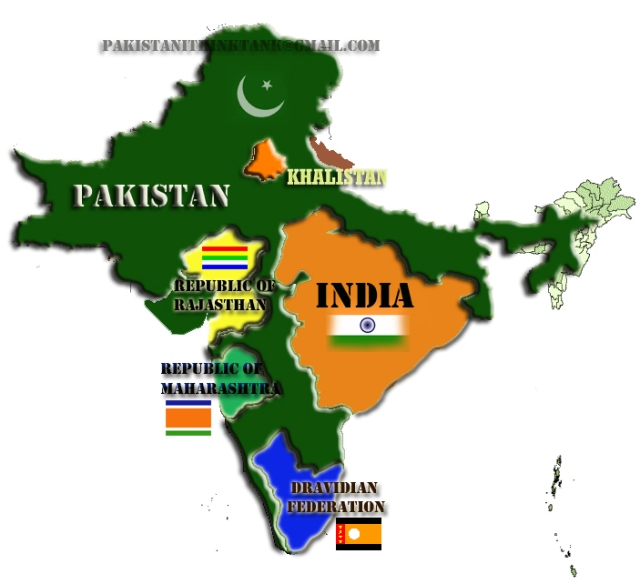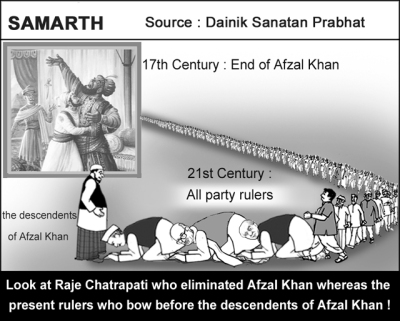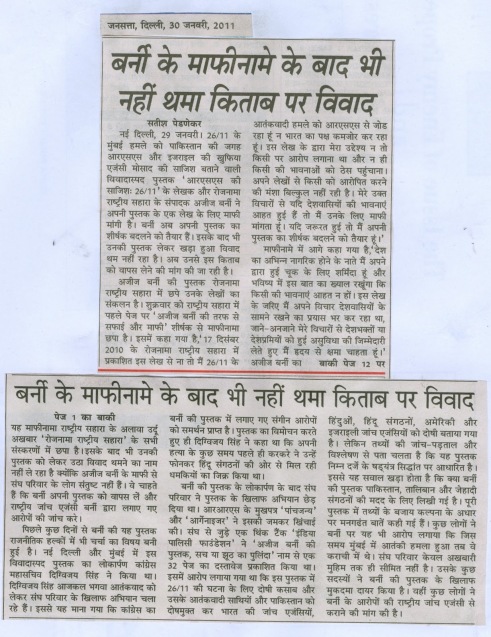!! समर्थ हिन्दु, समर्थ हिन्दुस्थान !!;........................!! समर्थ हिन्दुस्थान, समर्थ विश्व !!............................ All the posts on this blog are re-postings and post headings point towards the actual posts.
Thursday, February 10, 2011
Major Sandeep’s town in shock
After all Mohanan is a Hindu. So, who cares whether he immolates himself. Can you imagine what would have happened if it was a Muslim or Christian or even a Dalit doing this in the place of Mohanan, a higher caste Hindu? All the media, politicians and the beurocrats do not care if something happens to Hindus. This situation can change only if Hindus become united irrespective of their political affiliations. Will it ever happen?
ISLAMIC TERROR SPOUTING JOURNALIST CALLED AZIZ BURNEY
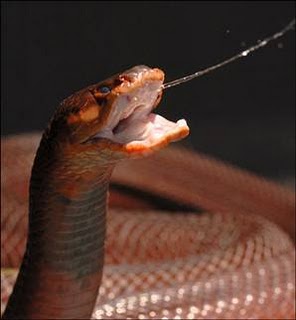
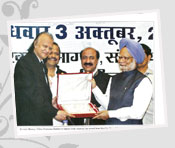
Date: 28 January 2011 21:45
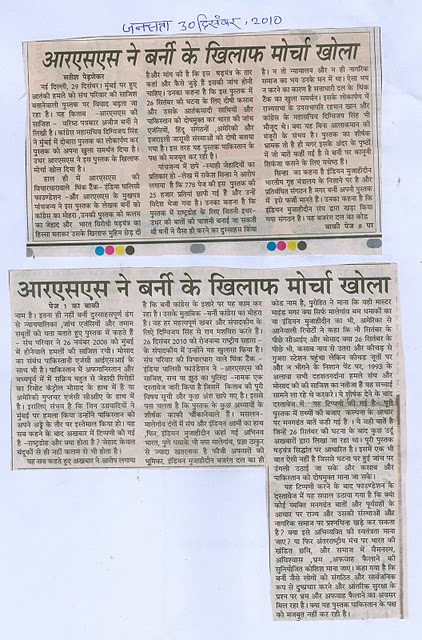

The front cover of the book of Aziz Burney states as follows: “Bharat Main Musalmanoun Ka Wahsheeyana Qatal-e-Aam Almaroof Daastan-e-hind. The liberal English translation of this anti-National title will be: “The wild and savage massacre of the Muslims of Bharat, in other words, the Story of India”. This traitor, this repository of some of the most virulent forms of anti-Indian hatred that have ever corroded the human breast, has taken the patently Pak-inspired treacherous care to exclude the Pak-Occupied Kashmir (POK) from the above Map of India. One cannot expect a whole-time ISI Agent like Aziz Burney to display any more respect towards and true concern for the sacred and sacrosanct Official Map of India.
Nursery Schools and Government Malfeasance
If you want the school system to turn your kids into retards, by all means get them enrolled into schools — the government mandates who will teach, what will be taught, who will attend, etc. But be prepared for the consequences.
~ ~ ~ ~ ~
In my opinion, homeschooling is not really a choice any more. It is the only alternative for parents who don’t want to handicap their children.
Religious Banking is here!
 In a previous post, we had pointed out how India has progressively moved towards compliance of religious laws. As it stands now, India is nearly as compliant as Pakistan, certainly more compliant than Malaysia.
In a previous post, we had pointed out how India has progressively moved towards compliance of religious laws. As it stands now, India is nearly as compliant as Pakistan, certainly more compliant than Malaysia.Warning: Security perils for India on road ahead
As India [ Images ] approaches the end of the 60th year as a republic, bad news seems to be coming in an avalanche.
The neighbourhood is in turmoil as even the President and prime minister of our western neighbour seek 'foreign' bodyguards. If ever there was a sign that radical forces like the Taliban [ Images ] are about to come to power there, this is it. With Wikileaks threatening to reveal the names of Swiss bank account holders, there is panic in the political class. Thus the external and internal crisis seem to be coming together to create a crisis that may well endanger the existence of our country.
The Indian nation is likely to be in peril in the coming decade. Will India survive this turbulence unscathed? With all my patriotic instincts in tact, the unfortunate answer to this loaded question is may be!
Readers bombarded with the recent endorsement of 'Brand India' by the high and mighty nations of the world, with President Barack Obama [ Images ] declaring that India has already emerged as a superpower, may wonder and even question the author's sanity.
This apparent Indian smugness and inability to see the gathering clouds on the security horizon, is at the heart of the dire prediction about India. But to uncover the looming danger to the nation's security in the coming decade, a brief look at the decade that is about to end is necessary. For the seeds of our possible misfortune lie in the events and policies of the past ten years.
India has long cherished a myth that there is something 'special' in Indian civilisation that has ensured that it has survived. Mohammed Iqbal, the poet, gave expression to this by saying that there is something special in us that guarantees our existence as a nation. Realistically speaking, the 7,000-year-old Indian civilisation owes its continued existence to accidents of history.
A navigational error led Columbus to America and Europeans hordes destroyed Red Indians instead of brown Indians. In the middle ages rulers like Aurangzeb embarked on a sincere mission to destroy Indian civilisation but the limitations of technology of killing (no machine guns and no nuclear weapons thwarted his ambition and Chhatrapati Shivaji led the Marathas in a un-Indian like resistance). Today the 'intent' of our adversaries remains the same and modern technology has given them the tools to achieve it.
The closing decade can well be called a dismal decade as far security is concerned. The attack on Parliament in 2001, co-ordinated bomb blasts in Delhi [ Images ]/Jaipur [ Images ]/Ahmedabad [ Images ]/Varanasi and two horrific attacks on Mumbai [ Images ] (the 2006 train blasts and 2008 armed attack on the metropolis), all had direct or indirect connection to Pakistan.
In 2001 in response to the attack on Parliament, India mobilised its armed forces and threatened all out war, but retreated. In case of the Mumbai attack of 2008, again we took no action. The lack of action in 2008 was all the more surprising as since 2001 India has been working on an appropriate response for precisely such an event.
The obvious conclusion is that we lack the necessary military superiority to carry out our threats. Even more worrying, leaks emerged that Pakistan is engaged in furiously increasing its nuclear arsenal -- at a pace fastest ever in world history.
To counter this we seem to be at a loss. The closing year saw multiple failures of the Agni missile tests. Even our space programme (of dual use) also had a string of failures. With loss of satellites to monitor our adversaries we will be at a distinct disadvantage. The sum of it all is that Pakistan has a distinct impression that it has overtaken us in nuclear and missile fields. There is an ever present danger that this would encourage adventurism.
Indian emphasis right from independence has been on economic development and minimal expenditure on security. But in the last six years of the United Progressive Alliance [ Images ] rule the obsession with GDP growth has been marked with neglect of defence.
Defence and development are like two legs, if one remains too far back the person/nation falls. But even more worrisome is the directionless-ness that one witnessed in the near fiasco of the Commonwealth Games [ Images ]! Here was an international event in which the nation had invested its prestige, yet the government only woke up when the foreign media highlighted the shoddy preparations.
In a typical knee-jerk reaction, last minute efforts were made to rectify the situation with the prime minister, no less, inspecting the Games Village! Is this also trend in our defence preparedness? The memories of how a bunch of ten desperados held Mumbai to ransom for 60 hours are still fresh.
Some months ago a leading national newspaper reported that the top bureaucrats (home, foreign and cabinet secretary), three service chiefs and directors of IB and RAW have decided to meet over lunch every month to informally sort out the inter-departmental issues. This ought to have caused a huge embarrassment and a public furore. It obviously means that the Prime Minister's Office whose job this is; is not functioning.
We have been lucky so far that the terrorists have targeted mainly humans. What if the terrorists were to change their strategy and attack dams, industrial, chemical or nuclear establishments? Do we still sit back and 'investigate' the crime and then go to the superpowers with our complaint. This is something that may well happen in the coming year.
It is well neigh impossible to protect every dam, refinery, chemical plant or other industrial centres, many of them in the private sector. If the terrorists decide to adopt this strategy, they will cause much more damage in terms of lives as well as economic costs.
The year 2011 is likely to see great turmoil in South Asia. The impending American withdrawal from Afghanistan, heightened Taliban activity in Pakistan, uncertainty in Iran, tensions on the Korean peninsula!
The next two years are likely to see China jockeying for power in wake of American withdrawal from Afghanistan. It is already making its ground by claiming Arunachal Pradesh and upping the ante on Kashmir [ Images ]. It should be clear to India by now that what we face from Pakistan is in reality a Chinese proxy threat. Are we ready to counter this?
It must be acknowledged that many of us, including this author have been wrong in predicting the demise of Pakistan. The negativity in Pakistan is so strong that it will continue to survive. It is India that is unprepared that is in danger of major setback. Add to this the efforts of politicians to deepen the fissures (classic divide and rule), a coherent national response to threat is missing.
On 1962 Sino-Indian border clash, there was one very intriguing question -- why did the Chinese attack in October 1962? After all the tensions had been brewing since 1959, but why 1962? Even a detailed study of the (still top secret) Henderson Brooks Report (external link) gave no clue.
Militarily starting a war in October made no sense -- in less than one month the Himalayan passes were to close due to snow -- exposing the troops to grave danger of being cutoff from logistic bases in Tibet [ Images ]. What is it that triggered the war at that moment? This author helped establish a clear link between the Cuban Missile Crisis of 1962 and the Chinese attack. Sample this: On September 19, 1962, the first rumblings of Cuban crisis and China attacks Dhola post. October 20, 1962: US orders naval blockade of Cuba and China launches attack on India. November 20, 1962 Cuban missile crisis is over after the Soviet Union agrees to withdraw missiles and the Chinese declare a unilateral ceasefire on November 21 and halt their advance. Are we looking at 1962 like situation again?
The greatest worry is however that larger public and leadership is unaware of the looming danger. You could clean the Games Village at the last minute, but how are we going to rustle up the required military strength when already under attack.
The nightmare scenario when brand new 7.62 self loading rifles in crates were dropped for the soldiers at Dirang Zong (Arunachal Pradesh) on November 14 in 1962 when the Chinese were a few kilometres away comes to mind. Have we learnt nothing from 1962?
Colonel Anil Athale (retd) is co-ordinator of Initiative for Peace, Arms-control & Disarmament, former head of War Studies Division of the Ministry of Defence and Shivaji Fellow of the United Services Institution.
Colonel Anil Athale (retd)
चाणक्यनीति के मूल में स्वार्थ नहीं, बल्कि परमार्थ है। यही कारण है कि चाणक्य ने अपने ग्रंथ के पहले ही श्लोक में तीन लोकों के नाथ ईश्वर को प्रणाम कर अपने ग्रंथ का मंगलाचरण करते हैं। ईश्वर के अस्तित्व को स्वीकार करना ही चाणक्य की राजनीति का सबसे महत्वपूर्ण सिद्धांत है। यदि किसी भी शासक को राजनीति में सफल होना है, तो उसे ईश्वर के अस्तित्व और धर्म के मूलभूत सिद्धांतों में श्रद्धा रखनी होगी।
चाणक्य नीति का महत्व:: ::चाणक्यनीति के मूल में स्वार्थ नहीं, बल्कि परमार्थ है।
यही कारण है कि चाणक्य ने अपने ग्रंथ के पहले ही श्लोक में तीन लोकों के नाथ ईश्वर को प्रणाम कर अपने ग्रंथ का मंगलाचरण करते हैं। ईश्वर के अस्तित्व को स्वीकार करना ही चाणक्य की राजनीति का सबसे महत्वपूर्ण सिद्धांत है।
यदि किसी भी शासक को राजनीति में सफल होना है, तो उसे ईश्वर के अस्तित्व और धर्म के मूलभूत सिद्धांतों में श्रद्धा रखनी होगी।
 आज देश की राजनीति का स्वरूप लगातार बदल रहा है। नहीं बदल रहा है, तो वह है नेताओं का चरित्र। इतना अवश्य जान लें कि जिस देश के राजनेता राजनीति के मूल सिद्धांतों को अच्छी तरह समझकर उसे अमल में लाएँगे, तो उस देश की प्रजा उतनी ही अधिक सुखी होगी और शासन यशस्वी बनेंगे। यह सच आज भारतीय राजनीति से बहुत दूर है। यहाँ प्रजा तो सुखी नहीं है, अलबत्ता राजनेता अपनी भावी पीढ़ियों के साथ बहुत ही अधिक खुश हैं। इन दिनों पूरे विश्व में अचानक कौटिल्य के अर्थशास्त्र की माँग बढ़ गई है। विदेशों के तथाकथित मैनेजमेंट गुरु भी कंपनियों के सफल संचालन के लिए कौटिल्य के सूत्र वाक्यों को अमल में लाने लगे हैं। कौटिल्य का अर्थशास्त्र तो लोकप्रिय है ही, इसके अलावा राजनीति पर उनकी लिखी किताब भी महत्वपूर्ण है। आज कौटिल्य के अर्थशास्त्र की तरह चाणक्यनीति भी विख्यात है। सबसे पहले यह भ्रम दूर कर लें कि चाणक्य और कौटिल्य अलग-अलग हैं। वास्तव में चाणक्य और कौटिल्य एक ही व्यक्ति का नाम है। जब भी कहीं चाणक्य राजनीति की बात आती है, तब हम समझते हैं कि यह किताब कुटिलता से भरपूर होगी। इसमें यह बताया गया होगा कि किस तरह से राजनीति में प्रतिद्वंद्वी को परास्त करें और सत्ता हासिल करें। चाणक्यनीति के बारे में यह हमारी भूल है कि हम ऐसा समझते हैं। दरअसल चाणक्यनीति के मूल में स्वार्थ नहीं, बल्कि परमार्थ है। यही कारण है कि चाणक्य ने अपने ग्रंथ के पहले ही श्लोक में तीन लोकों के नाथ ईश्वर को प्रणाम कर अपने ग्रंथ का मंगलाचरण करते हैं। ईश्वर के अस्तित्व को स्वीकार करना ही चाणक्य की राजनीति का सबसे महत्वपूर्ण सिद्धांत है। यदि किसी भी शासक को राजनीति में सफल होना है, तो उसे ईश्वर के अस्तित्व और धर्म के मूलभूत सिद्धांतों में श्रद्धा रखनी होगी। आज हमारे देश में सांप्रदायिक ताकतें लगातार बलशाली होती जा रहीं हैं। इसके रहते कोई भी शासक सफल नहीं हो सकता। इसे ही ध्यान में रखकर अपनी दूरदर्शिता दिखाते हुए चाणक्य ने ग्रंथ लिखा। अपने ग्रंथ के बारे में चाणक्य पूरी तरह से स्पष्ट हैं। चाणक्य कहते हैं ‘मैं यहाँ प्रजा के कल्याण के लिए राजनीति के ऐसे रहस्यों का उद्घाटन करुँगा, जिसे जानने के बाद व्यक्ति सर्वज्ञ बन जाएगा।’ यहाँ पर चाणक्य ने व्यक्ति के लिए जिस सर्वज्ञ शब्द कहा है, उसका आशय यही है कि ऐसा व्यक्ति संसार के सभी व्यवहारों को समझने लगेगा, अर्थात वह पूर्णत: व्यावहारिक हो जाएगा। उसका संबंध आध्यात्मिक जगत के साथ नहीं होगा। आध्यात्मिक दृष्टि प्राप्त करने वाले तो महात्मा होते हैं। चाणक्य दावे के साथ कहते हैं कि जो व्यक्ति मेरे ग्रंथ से राजनीति के इस विज्ञान को समझेगा, वही प्रजा का कल्याण कर पाएगा। चाणक्य ने यहाँ पर ज्ञान नहीं, बल्कि विज्ञान शब्द का प्रयोग किया है। राजनीति के सिद्धांतों का अभ्यास करने की क्रिया को ही ज्ञान कहा जाता है। इसे समाज के एक-एक व्यक्ति के हित में उसका उपयोग करना विज्ञान कहलाता है। ज्ञान की अपेक्षा विज्ञान अधिक सारगर्भित है। चाणक्य यह दावा नहीं करते कि इस ग्रंथ में जो कुछ लिखा गया है, वह मौलिक है। पहले ही श्लोक में वे कहते हैं कि अनेक शास्त्रों में से चुन-चुनकर राजनीति की बातों का संपादित किया है। इस वाक्य में ही चाणक्य की ईमानदारी और पारदर्शिता झलकती है। आज का युग चाणक्य के पाठकों को अँधेरे में रखना नहीं चाहता। वे स्पष्ट रूप से कुबूल करते हैं कि मैंने तो राजनीति के सिद्धांतों का संकलन ही किया है। इस तरह से संकलित कर चाणक्य ने अनेक पूर्व महर्षियो के ज्ञान की धरोहर को जीवंत रखा है और हम तक उसे पहुँचाने का पुण्य कार्य किया है। किसी भी ग्रंथ को पढ़ने और उसे अमल में लाने के पहले हमें यह जान लेना आवश्यक है कि इस ग्रंथ का अभ्यास करने से हमें क्या लाभ होगा? चाणक्य ने पने ग्रंथ के प्रारंभ में ही इस प्रश्न का उत्तर दे दिया है। चाणक्य कहते हैं कि इस नीतिशास्त्र को सही अर्थो में समझा है, तो वे यह अच्छी तरह से जान जाएँगे कि कौन-सा कार्य अच्छा है और कौन-सा बुरा। इस माध्यम से उन्होंेने उत्तम मनुष्य की व्याख्या भी कर दी है। उत्तम मनुष्य उसे कहते हैं, जो नीतिशास्त्र केमूल सिद्धांतों को स्वयं अमल में लाए, उसके आधार पर प्रजा को क्या करना चाहिए, क्या नहीं करना चाहिए, यह भी स्पष्ट हो जाएगा। ईष्ट क्या है और अनिष्ट कय है, इसका भी बोध यह ग्रंथ कराएगा। चाणक्य का नीतिशास्त्र प्रजा को सुखी बनाने का शास्त्र है। कोई भी व्यक्ति, जो सुखी होना चाहता है, उसे जीवन को दु:खी बनाने वाले तत्वों की पहचान पहले कर लेनी चाहिए। चाणक्य का नीतिशास्त्र बहुत ही व्यावहारिक बातें करता है। इसी कारण सुख के साधनों की तलाश करने के बदले दु:ख पैदा करने वाले साधनों को पहचान लेना चाहिए, ताकि सुख प्राप्त करने में ये तत्व बाधक न बनें। आखिर कहाँ हैं ये दु:ख देने वाले तत्व? चाणक्य कहते हैं ‘मूर्ख व्यक्ति को दिया जाने वाला उपदेश, कुलटा स्त्री का भरण-पोषण और दु:खी लोगों का संसर्ग विद्वानों को भीे दु:खी बना देता है। ’ जिसे सुखी होना है, उसे कभी भी मूर्ख व्यक्ति को उपदेश नहीं देना चाहिए। कुलटा स्त्री का भरण-पोषण नहीं करना चाहिए। यहाँ पर दुखियारों की मदद करना निषेध नहीं माना है, पर उसके साथ रहने का निषेध किया गया है। क्योंकि उसका संक्रमण अवश्य होगा। जैन शास्त्रों में भी लिखा गया है कि मूर्ख व्यक्ति को उपदेश देना ऐसा है, जैसे खुजली वाले कुत्ते के शरीर पर चंदन का लेप मलना। ये बेकार की मेहनत है। इसका कोई परिणाम नहीं निकलेगा। इससे निराशा ही मिलती है। बारिश में भीगने वाले बंदर से पेड़ के पक्षियों ने घोसला बनाने की सलाह दी। इससे क्रोधित होकर बंदर ने पक्षियों के घोसलों को ही नष्ट कर दिया। सइी तरह कुलटा स्त्री साँप की तरह है, जिसे दूध पिलाकर हम यह समझें कि हमने उस पर दया की। जो दया करने वाले के प्रति फादारी नहीं कर सकती, उसका भरण-पोषण करना पति का कर्तव्य नहीं है। आज का कानून भी पति से बेवफाई करने वाली स्त्री से तलाक लेने की सलाह देता है। दु:खी मनुष्यों में से एक प्रकार की नकारात्मक ऊर्जा प्रवाहित होती है। इस कारण ऐसे लोगों के साथ रहने वाला भी निराशावादी हो जाता है। जिन्हें आशावादी बनना हो, उसे आशावादियों के साथ रहना चाहिए। सोहबत का असर इंसानों पर ही सबसे पहले होता है। यह चाणक्य बहुत पहले कह गए हैं। बाद के श्लोक में चाणक्य मनुष्य के जीवन के लिए सबसे अधिक हानिकारक चार तत्वों की बात करते हैं। चाणक्य कहते हैं ‘दुष्ट पत्नी, शठ मित्र, आज्ञा न मानने वाले नौकर और घर में बसने वाला साँप’ ये चारों मृत्यु के समान हैं। पति और पत्नी संसाररूपी रथ के दो पहिए है, यदि पत्नी दुष्ट हो, तो जीवन के हर कदम पर अवरोध पैदा होते हैं और संसार का यह रथ बराबर चल नहीं पाता। रणभूमि पर शत्रुओं का वीरतापूर्वक मुकाबला करने वाला पराक्रमी योद्धा भी पत्नी के सामने लाचार बन जाता है। दुष्ट पत्नी अपने पति के लिए अभिशाप होती है। वह सज्जन पुरुष का जीवन हराम कर देती है। पत्नी दुष्ट हो, तो घर से सुख-शांति हमेशा के लिए चली जाती है। जिस घर में शांति न हो, उसका समाज में भी कोई मान-सम्मान नहीं होता। पत्नी बेवफा हो, तो अरबों की दौलत भी सुख नहीं दे सकती। इंसान की सबसे बड़ी पूँजी उसकी संतान और मित्र है। जिन्हें अच्छे मित्र मिले, वह विश्व का सबसे भाग्यशाली व्यक्ति है। जिन्हें धूर्त मित्र मिले हैं, वह विश्व का सबसे बड़ा दुर्भाग्यशाली व्यक्ति है। मनुष्य किसी भी व्यक्ति के साथ मित्रता करे, तब उसे उसके दुगरुणों के बारे में जानकारी नहीं होती, उसे यह विश्वास होता है कि मुसीबत के समय सहायता करने वालों में यही सबसे आगे होगा। मित्र तो सहायता करेगा ही। वास्तव में जीवन में जब बाधाएँ आती हैं और तब हमने मित्र से सहायता की अपेक्षा रखी हो, तभी वह धोखा दे जाए, तो कैसा लगता है? समाज में दूसरे लोग हमारे साथ धोखाधड़ी करते हैं, तब हमें आघात नहीं लगता, पर जब मित्र ही हमसे धोखा करने लगे, तो उस आघात को सहना बहुत ही मुश्किल होता है। इसी तरह मालिक का आदेश न मानने वाला नौकर भी खतरनाक होता है। घर में जब मेहमान आएँ हो, उस समय यदि उसे कोई आदेश दिया जाए, तभी नौकर सेठ का अपमान कर दे, तो यह बात सेठ के लिए बहुत ही अधिक आघातजनक होगी। लोग यह दलील देते हैं कि चाणक्य आज से 2400 वर्ष पूर्व पैदा हुए थे। उसके समय की राजनीति और आज की राजनीति में जमीन-आसमान का अंतर है। तो उसका जवाब यह है कि चाणक्य ने अपने ग्रंथ में राजनीति के शाश्वत सिद्धांतों की चर्चा की है। राजनीति के साथ-साथ उन्होंने समाजशास्त्र के महत्वपूर्ण सिद्धांतों को भी समझाया है। यह सिद्धांत प्राचीन काल में जितने प्रासंगिक थे, आज भी उतने ही प्रासंगिक हैं। देश में राजशाही हो या लोकशाही, पर राजनीति के सिद्धांत कभी नहीं बदलते। जो राजनेता सिद्धांतों की जानकारी प्राप्त कर लेते है, वे अपने आप को देश, काल और परिस्थितियों के अनुरूप ढाल सकते हैं।
आज देश की राजनीति का स्वरूप लगातार बदल रहा है। नहीं बदल रहा है, तो वह है नेताओं का चरित्र। इतना अवश्य जान लें कि जिस देश के राजनेता राजनीति के मूल सिद्धांतों को अच्छी तरह समझकर उसे अमल में लाएँगे, तो उस देश की प्रजा उतनी ही अधिक सुखी होगी और शासन यशस्वी बनेंगे। यह सच आज भारतीय राजनीति से बहुत दूर है। यहाँ प्रजा तो सुखी नहीं है, अलबत्ता राजनेता अपनी भावी पीढ़ियों के साथ बहुत ही अधिक खुश हैं। इन दिनों पूरे विश्व में अचानक कौटिल्य के अर्थशास्त्र की माँग बढ़ गई है। विदेशों के तथाकथित मैनेजमेंट गुरु भी कंपनियों के सफल संचालन के लिए कौटिल्य के सूत्र वाक्यों को अमल में लाने लगे हैं। कौटिल्य का अर्थशास्त्र तो लोकप्रिय है ही, इसके अलावा राजनीति पर उनकी लिखी किताब भी महत्वपूर्ण है। आज कौटिल्य के अर्थशास्त्र की तरह चाणक्यनीति भी विख्यात है। सबसे पहले यह भ्रम दूर कर लें कि चाणक्य और कौटिल्य अलग-अलग हैं। वास्तव में चाणक्य और कौटिल्य एक ही व्यक्ति का नाम है। जब भी कहीं चाणक्य राजनीति की बात आती है, तब हम समझते हैं कि यह किताब कुटिलता से भरपूर होगी। इसमें यह बताया गया होगा कि किस तरह से राजनीति में प्रतिद्वंद्वी को परास्त करें और सत्ता हासिल करें। चाणक्यनीति के बारे में यह हमारी भूल है कि हम ऐसा समझते हैं। दरअसल चाणक्यनीति के मूल में स्वार्थ नहीं, बल्कि परमार्थ है। यही कारण है कि चाणक्य ने अपने ग्रंथ के पहले ही श्लोक में तीन लोकों के नाथ ईश्वर को प्रणाम कर अपने ग्रंथ का मंगलाचरण करते हैं। ईश्वर के अस्तित्व को स्वीकार करना ही चाणक्य की राजनीति का सबसे महत्वपूर्ण सिद्धांत है। यदि किसी भी शासक को राजनीति में सफल होना है, तो उसे ईश्वर के अस्तित्व और धर्म के मूलभूत सिद्धांतों में श्रद्धा रखनी होगी। आज हमारे देश में सांप्रदायिक ताकतें लगातार बलशाली होती जा रहीं हैं। इसके रहते कोई भी शासक सफल नहीं हो सकता। इसे ही ध्यान में रखकर अपनी दूरदर्शिता दिखाते हुए चाणक्य ने ग्रंथ लिखा। अपने ग्रंथ के बारे में चाणक्य पूरी तरह से स्पष्ट हैं। चाणक्य कहते हैं ‘मैं यहाँ प्रजा के कल्याण के लिए राजनीति के ऐसे रहस्यों का उद्घाटन करुँगा, जिसे जानने के बाद व्यक्ति सर्वज्ञ बन जाएगा।’ यहाँ पर चाणक्य ने व्यक्ति के लिए जिस सर्वज्ञ शब्द कहा है, उसका आशय यही है कि ऐसा व्यक्ति संसार के सभी व्यवहारों को समझने लगेगा, अर्थात वह पूर्णत: व्यावहारिक हो जाएगा। उसका संबंध आध्यात्मिक जगत के साथ नहीं होगा। आध्यात्मिक दृष्टि प्राप्त करने वाले तो महात्मा होते हैं। चाणक्य दावे के साथ कहते हैं कि जो व्यक्ति मेरे ग्रंथ से राजनीति के इस विज्ञान को समझेगा, वही प्रजा का कल्याण कर पाएगा। चाणक्य ने यहाँ पर ज्ञान नहीं, बल्कि विज्ञान शब्द का प्रयोग किया है। राजनीति के सिद्धांतों का अभ्यास करने की क्रिया को ही ज्ञान कहा जाता है। इसे समाज के एक-एक व्यक्ति के हित में उसका उपयोग करना विज्ञान कहलाता है। ज्ञान की अपेक्षा विज्ञान अधिक सारगर्भित है। चाणक्य यह दावा नहीं करते कि इस ग्रंथ में जो कुछ लिखा गया है, वह मौलिक है। पहले ही श्लोक में वे कहते हैं कि अनेक शास्त्रों में से चुन-चुनकर राजनीति की बातों का संपादित किया है। इस वाक्य में ही चाणक्य की ईमानदारी और पारदर्शिता झलकती है। आज का युग चाणक्य के पाठकों को अँधेरे में रखना नहीं चाहता। वे स्पष्ट रूप से कुबूल करते हैं कि मैंने तो राजनीति के सिद्धांतों का संकलन ही किया है। इस तरह से संकलित कर चाणक्य ने अनेक पूर्व महर्षियो के ज्ञान की धरोहर को जीवंत रखा है और हम तक उसे पहुँचाने का पुण्य कार्य किया है। किसी भी ग्रंथ को पढ़ने और उसे अमल में लाने के पहले हमें यह जान लेना आवश्यक है कि इस ग्रंथ का अभ्यास करने से हमें क्या लाभ होगा? चाणक्य ने पने ग्रंथ के प्रारंभ में ही इस प्रश्न का उत्तर दे दिया है। चाणक्य कहते हैं कि इस नीतिशास्त्र को सही अर्थो में समझा है, तो वे यह अच्छी तरह से जान जाएँगे कि कौन-सा कार्य अच्छा है और कौन-सा बुरा। इस माध्यम से उन्होंेने उत्तम मनुष्य की व्याख्या भी कर दी है। उत्तम मनुष्य उसे कहते हैं, जो नीतिशास्त्र केमूल सिद्धांतों को स्वयं अमल में लाए, उसके आधार पर प्रजा को क्या करना चाहिए, क्या नहीं करना चाहिए, यह भी स्पष्ट हो जाएगा। ईष्ट क्या है और अनिष्ट कय है, इसका भी बोध यह ग्रंथ कराएगा। चाणक्य का नीतिशास्त्र प्रजा को सुखी बनाने का शास्त्र है। कोई भी व्यक्ति, जो सुखी होना चाहता है, उसे जीवन को दु:खी बनाने वाले तत्वों की पहचान पहले कर लेनी चाहिए। चाणक्य का नीतिशास्त्र बहुत ही व्यावहारिक बातें करता है। इसी कारण सुख के साधनों की तलाश करने के बदले दु:ख पैदा करने वाले साधनों को पहचान लेना चाहिए, ताकि सुख प्राप्त करने में ये तत्व बाधक न बनें। आखिर कहाँ हैं ये दु:ख देने वाले तत्व? चाणक्य कहते हैं ‘मूर्ख व्यक्ति को दिया जाने वाला उपदेश, कुलटा स्त्री का भरण-पोषण और दु:खी लोगों का संसर्ग विद्वानों को भीे दु:खी बना देता है। ’ जिसे सुखी होना है, उसे कभी भी मूर्ख व्यक्ति को उपदेश नहीं देना चाहिए। कुलटा स्त्री का भरण-पोषण नहीं करना चाहिए। यहाँ पर दुखियारों की मदद करना निषेध नहीं माना है, पर उसके साथ रहने का निषेध किया गया है। क्योंकि उसका संक्रमण अवश्य होगा। जैन शास्त्रों में भी लिखा गया है कि मूर्ख व्यक्ति को उपदेश देना ऐसा है, जैसे खुजली वाले कुत्ते के शरीर पर चंदन का लेप मलना। ये बेकार की मेहनत है। इसका कोई परिणाम नहीं निकलेगा। इससे निराशा ही मिलती है। बारिश में भीगने वाले बंदर से पेड़ के पक्षियों ने घोसला बनाने की सलाह दी। इससे क्रोधित होकर बंदर ने पक्षियों के घोसलों को ही नष्ट कर दिया। सइी तरह कुलटा स्त्री साँप की तरह है, जिसे दूध पिलाकर हम यह समझें कि हमने उस पर दया की। जो दया करने वाले के प्रति फादारी नहीं कर सकती, उसका भरण-पोषण करना पति का कर्तव्य नहीं है। आज का कानून भी पति से बेवफाई करने वाली स्त्री से तलाक लेने की सलाह देता है। दु:खी मनुष्यों में से एक प्रकार की नकारात्मक ऊर्जा प्रवाहित होती है। इस कारण ऐसे लोगों के साथ रहने वाला भी निराशावादी हो जाता है। जिन्हें आशावादी बनना हो, उसे आशावादियों के साथ रहना चाहिए। सोहबत का असर इंसानों पर ही सबसे पहले होता है। यह चाणक्य बहुत पहले कह गए हैं। बाद के श्लोक में चाणक्य मनुष्य के जीवन के लिए सबसे अधिक हानिकारक चार तत्वों की बात करते हैं। चाणक्य कहते हैं ‘दुष्ट पत्नी, शठ मित्र, आज्ञा न मानने वाले नौकर और घर में बसने वाला साँप’ ये चारों मृत्यु के समान हैं। पति और पत्नी संसाररूपी रथ के दो पहिए है, यदि पत्नी दुष्ट हो, तो जीवन के हर कदम पर अवरोध पैदा होते हैं और संसार का यह रथ बराबर चल नहीं पाता। रणभूमि पर शत्रुओं का वीरतापूर्वक मुकाबला करने वाला पराक्रमी योद्धा भी पत्नी के सामने लाचार बन जाता है। दुष्ट पत्नी अपने पति के लिए अभिशाप होती है। वह सज्जन पुरुष का जीवन हराम कर देती है। पत्नी दुष्ट हो, तो घर से सुख-शांति हमेशा के लिए चली जाती है। जिस घर में शांति न हो, उसका समाज में भी कोई मान-सम्मान नहीं होता। पत्नी बेवफा हो, तो अरबों की दौलत भी सुख नहीं दे सकती। इंसान की सबसे बड़ी पूँजी उसकी संतान और मित्र है। जिन्हें अच्छे मित्र मिले, वह विश्व का सबसे भाग्यशाली व्यक्ति है। जिन्हें धूर्त मित्र मिले हैं, वह विश्व का सबसे बड़ा दुर्भाग्यशाली व्यक्ति है। मनुष्य किसी भी व्यक्ति के साथ मित्रता करे, तब उसे उसके दुगरुणों के बारे में जानकारी नहीं होती, उसे यह विश्वास होता है कि मुसीबत के समय सहायता करने वालों में यही सबसे आगे होगा। मित्र तो सहायता करेगा ही। वास्तव में जीवन में जब बाधाएँ आती हैं और तब हमने मित्र से सहायता की अपेक्षा रखी हो, तभी वह धोखा दे जाए, तो कैसा लगता है? समाज में दूसरे लोग हमारे साथ धोखाधड़ी करते हैं, तब हमें आघात नहीं लगता, पर जब मित्र ही हमसे धोखा करने लगे, तो उस आघात को सहना बहुत ही मुश्किल होता है। इसी तरह मालिक का आदेश न मानने वाला नौकर भी खतरनाक होता है। घर में जब मेहमान आएँ हो, उस समय यदि उसे कोई आदेश दिया जाए, तभी नौकर सेठ का अपमान कर दे, तो यह बात सेठ के लिए बहुत ही अधिक आघातजनक होगी। लोग यह दलील देते हैं कि चाणक्य आज से 2400 वर्ष पूर्व पैदा हुए थे। उसके समय की राजनीति और आज की राजनीति में जमीन-आसमान का अंतर है। तो उसका जवाब यह है कि चाणक्य ने अपने ग्रंथ में राजनीति के शाश्वत सिद्धांतों की चर्चा की है। राजनीति के साथ-साथ उन्होंने समाजशास्त्र के महत्वपूर्ण सिद्धांतों को भी समझाया है। यह सिद्धांत प्राचीन काल में जितने प्रासंगिक थे, आज भी उतने ही प्रासंगिक हैं। देश में राजशाही हो या लोकशाही, पर राजनीति के सिद्धांत कभी नहीं बदलते। जो राजनेता सिद्धांतों की जानकारी प्राप्त कर लेते है, वे अपने आप को देश, काल और परिस्थितियों के अनुरूप ढाल सकते हैं।अब कांग्रेस का हाथ अफजल के साथ
अब कांग्रेस का हाथ अफजल के साथ
मोहम्मद अफजल कि फांसी टाल सकती हैं, रोक नहीं सकती यूपीए सरकार
2012: START OF MAYA CALENDAR OR MODI?
An analysis of the political, societal and security related developments that affect India as it readies to reclaim its place among the great nations of the world.Suddenly, skeletons are tumbling out of the proverbial cupboard almost every day, shocking a nation already gaping in disbelief into a surreal numbness. The sheer scale of the plunder and the disdain with which the Congress party is continuing to dismiss the avalanche of charges in a manner that would be unthinkable in any other country, seem to suggest that India is headed towards some sort of a climactic event, without which there appears, as of now, little hope of any serious corrective measures being put in place, and no possibility of criminals who rule this nation being put out of business and into prison.
Hindus stop Muslim insolence in Nashik
Celebrate Valentine's Day not with your lover, but with your parents
Anti-Hindu and Anti-National Idris Nayakwadi elected as Mayor of Miraj
he other candidate of NCP Mr. Suresh Avati withdrew his candidature at the last moment thus ending competition in the election. BJP councilors also voted for Nayakwadi. Mr. Yuvaraj Bavadekar of BJP has been elected as the Deputy Mayor.
Boycott 'Vidya Balan' who agreed to pose nude for M F Husain
When the Unemployed Lose Faith in the System
Blowing Bubbles The Daily Reckoning Presents | |||
There are reasons to be careful, which I'll get to. First, on the face of it, we've had a great run. The S&P 500's fourth- quarter earnings, at the halfway mark, were 17% ahead of last year's. Importantly, sales were up 9%. So this is no longer a story of cost cutting. Most everyone is doing well, save utilities and health care companies, which have reported declines in profits as a group. Mining and energy companies are doing especially well, with profit growth north of 40%. The media don't get how this earnings picture squares with stubbornly high unemployment. I talked to one reporter recently about this very thing. One simple reason for this disconnect is that some of the best sources of profits for many of these firms has been from overseas operations. Many US firms are still cutting jobs, like Boeing and Lowe's. Profits from emerging markets, meanwhile, grow apace. There are bright spots in the US, too, of course. US manufacturing is getting a boost. Caterpillar will spend $3 billion this year in capital expenditures to add capacity, more than half in the US. And Emerson said it expects US nonresidential investment to grow 8-9%. Eaton, another US manufacturer, actually said it expects its US sales to grow faster than its overseas operations. US new vehicle sales were up 17% in January. We're at a run rate of 12.6 million vehicles, much better than the 10.8 million run rate of a year ago, but well off the 16 million automakers enjoyed pre-crisis. So it's a bit of a muddled cherry. As always, you have to pick your spots, which is what we're all about. A fly in this whole whiskey sour is inflation. It's definitely here and it's having an impact. Rising costs are squeezing some manufacturers. Whirlpool, for example, said it would boost prices 8-10% to cover rising raw material costs. This sort of thing is rippling across all sectors. Prices are going up everywhere. Nalco Holding (NYSE:NLC), a world leader in water purification, recently reported disappointing earnings, largely due to rising raw material costs. The stock sold off on the news. But looking out longer term, the world's need for clean water only grows more acute. Despite the short-term effects of rising raw material costs, Nalco ought to be able to grow core profits at double-digit percentages for years to come. It is a very strong company that generates a tremendous amount of free cash flow - $185 million last year, to be exact. So if companies as robust as Nalco are feeling the effects of rising prices, run-of-the-mill companies across the country must also be feeling the effects. In fact, I was fascinated recently by a story in The Wall Street Journal titled, 'Fearing Inflation, Firms Stocking Up.' The story talks about how companies are stockpiling rubber tires, cotton clothing and other goods to insulate themselves from inflation. Anecdotally, McCormick stockpiled some ingredients for its spices, Anton Sport bought more fabric than it needed, and Monro Muffler bought extra tires and oil. These purchases are still a small part of overall purchases, but it's a new trend and something we haven't seen in years. For most of the last handful of years, companies tried to shed inventory, not carry it. But what these actions essentially say is that these firms would rather hold real things than cash. I think we'll see more of the same. While inflation is here and everyone seems to see it, the central bankers of the US and Europe seem unconcerned. Of course, they have every incentive to continue to let the money presses run. According to economists Joshua Aizenman and Nancy Marion, inflation did half the work of cutting US government debt from 122% of the economy to 25% from 1945-1973. So with the US government saddled with debts it can never repay, the way out is to debase the currency. Let those printing presses hum and keep interest rates low. Of course, such money printing also puts in motion great monetary accidents. As the old Austrian economists warned, the new money stimulates investing, but it creates an illusion. It's like giving off signals that there is plenty of gas in the tank when, in fact, it's nearly empty. These easy-money policies helped create the great housing bubble. And the easy-money policies today will create a big bubble somewhere else, which will turn into tomorrow's bust. Regards, Chris Mayer, for The Daily Reckoning |
SIT, the Seculars and Narendra Modi
The Hindutva of Development is the Rupee-yatra of late 2000 — Chhattisgarh, Madhya Pradesh and Himachal follow Gujarat — and aids the development of modern Hindutva. Modinomics threatens Manmohanomics; in this age of scams, spiralling prices and coalition pressures, the Congress party is returning to minority politics as its survival strategy for the next decade.
